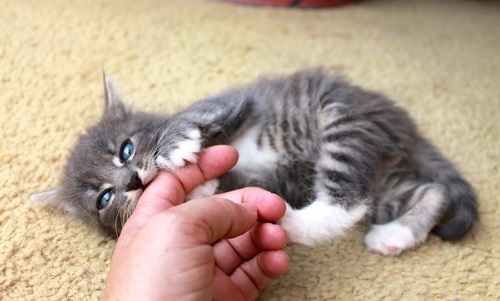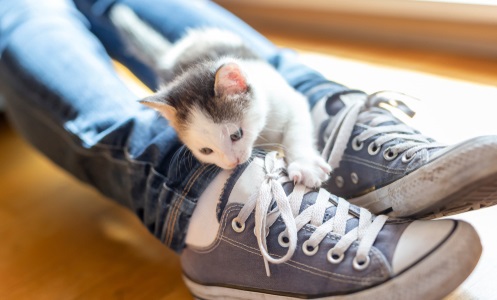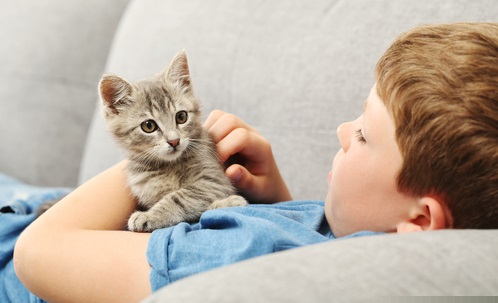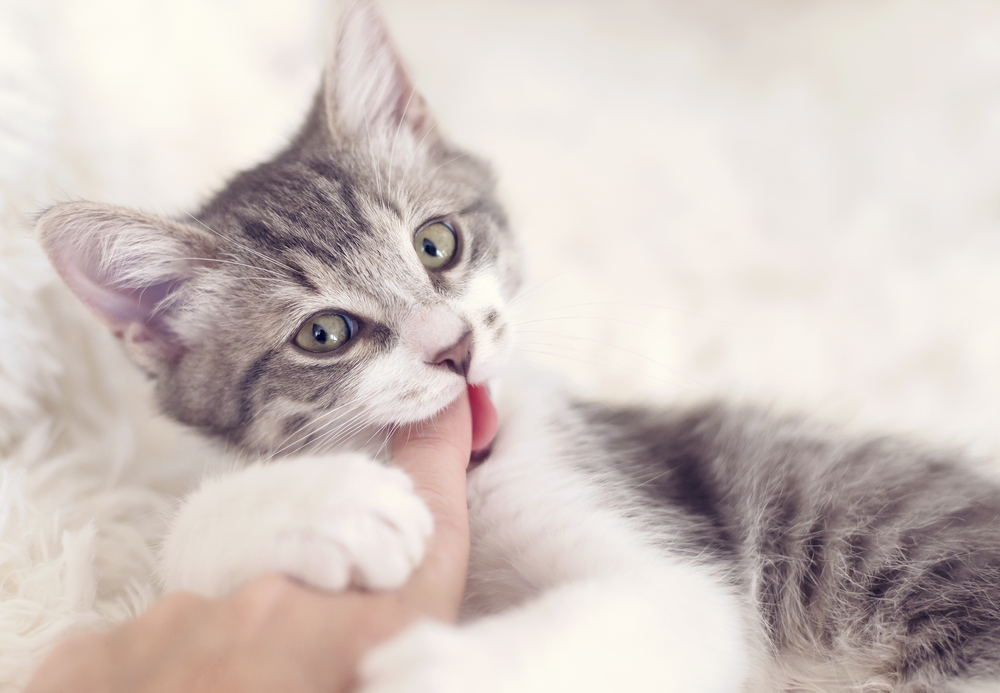Ask nearly any cat owner if they’ve been bitten by their pet at one point or another and the chances are pretty high that the answer is “yes”. While this doesn’t necessarily mean their feline companion was acting out, it is important for pet parents – especially first-time kitten owners – to understand the psychology behind feline behavior. In fact, many cat moms and dads may be wondering, “why do kittens like to bite?”, only to discover that no matter what they do, they can’t curb their little fuzzball of this annoying (and sometimes painful) habit. Read on for helpful advice explaining why kittens bite, helpful training tips, and other insightful information.
Why Do Kittens Bite: Recognizing Feline Instincts
For fur baby folks, part of being a dedicated pet parent is learning not only their likes and dislikes, but understanding why animals behave the way they do. For example, acknowledging their biological ancestry provides a bit of insight into their instinctual behavior – after all, cats are a predatory species by design. Therefore, it probably comes as no surprise that they, too, will be inclined to hunt, attack, chew, pounce, and so on – even though the ‘prey’ will more than likely be a pet parent’s toe versus a small mammal or bird. And just like their feline brethren in the wild, a kitten will begin to visually track objects right out of the gate. In fact, at the tender age of only 4 weeks old, he will practice his pounce, ‘attacking’ anything that appears to be prey, even if it’s only a toy mouse (or an unsuspecting human). Although biting, chomping, gnawing and nibbling may be perfectly natural for a kitten, it’s important for parents to set guidelines early on to curb such behavior from becoming the norm.
Breaking Bad Habits: Why It’s Important To Stop Your Kitty From Biting Early On

Similar to toddlers, kittens explore their surroundings with their mouths – biting isn’t necessarily aggressive behavior, but learning about their environment. Another thing kittens have in common with young children: they must also be taught right from wrong at an early age in order to prevent bad habits from setting in. And just like little kids, kittens will test their boundaries until an older family member sets them straight. For example, they may pounce on feet poking out of the bedsheets, or bite when they see a stray finger poking around their belly – after all, they’re just learning how to ‘stalk’ what they consider ‘prey’ in their environment.
Since kittens are testing out this instinctual skill set, they are naturally going to be curious in their surroundings. With that said, owners can expect to get a nibble now and again from an inquisitive kitty – but if he is constantly lunging at bare feet or biting the family’s hands every chance he can get, it’s time to establish some ground rules. For the most part, kittens are fairly adaptive: the sooner training has begun, the better chance pet parents will have at breaking them of habits that, if left unchecked, could last a lifetime. And let’s face it: nobody enjoys a 15-pound cat dive bombing guests and nipping at their ankles.
How To Stop Your Kitty From Biting You: What Every Pet Parent Should Know
As mentioned, cats are born predators and are therefore instinctually set up to go into attack-mode on moving objects whenever the chance presents itself. Keeping this in mind, pet parents are wise to redirect a kitten’s biological instincts at a very young age – in other words, teach them to play with their toys or a favorite old sock versus feet or fingers! Setting a routine each day can help kitties develop good habits. In fact, many experts recommend engaging with kittens several times a day before meals to promote appropriate behavior. In addition, rigorous playing with the family kitten on a regular basis encourages fine motor skill development and gets rid of their pent-up energy. The latter can be very important for cat owners, particularly for those who are out of the house for a good portion of the day.
Helpful Tip: It’s not uncommon for kittens who are left alone for long periods of time to engage in destructive behavior around the house when mom and dad are gone. In order to help prevent furniture and other surfaces from getting torn up, try to engage in playtime with kitties at least once a day. Pet parents may also wish to get a dedicated cat scratching post for their kittens. In addition to satisfying their primal need to sharpen their claws, cat scratchers also provide stress-relief (while saving upholstered surfaces for their humans).
Teach Your Kitten Well: How To Nip Biting In The Bud
Teaching kittens early on has been shown to help curb bad habits, but what’s the best way to engage with a frisky kitty and get the desired results? Below, some useful guidelines for your favorite feline:
Provide enriching toys & games
One of the first things pet parents will want to invest in is a thoughtful assortment of cat toys. Whether he prefers wand toys, mouse plushies, activity centers, tunnels, or other stuffed animals that resemble ‘prey’, a kitten needs a variety of stimulation to remain interested and engaged in playtime. Check out the 9 best cat toys of 2020 for the most popular pet picks.
Make a play-date (and stick to it)

When it comes to playtime with kittens, it doesn’t begin and end with throwing a ball on the carpet. Pet parents need to engage with their kittens – that is, wave the wand toy around so he has to jump up, stalk, and yes – maybe even bite it. The purpose of this kind of activity is to engage his natural predatory instincts – let him ‘hunt’ for the toy as a moving target instead of attacking bare feet and hands. Once he gets used to doing this every day, he will look forward to the experience and learn that ‘target practice’ is for his toys, not his humans.
Reinforce good behavior with rewards
Give frolicking kitties the chance to catch their favorite catnip stuffie – it’s okay if he bites or bunny-kicks it; after all, that’s what he’d be doing outdoors if he caught his prey! Rewarding kittens after playtime reinforces he’s done a good job at ‘hunting’ – let him know with a tasty treat or meal. In fact, some experts recommend playtime before meals, as play-hunting followed up by food mimics cats catching prey and eating it as they would in the wild.
Correct inappropriate biting with consistent redirection
Kittens need to bite – it’s in their DNA to hunt and chomp on the nearest moving target. However, they need guidance, and that’s when pet parents must step up their game. Experts recommend redirecting any inappropriate biting behavior (for example, your fingers) towards a more suitable option (e.g., their favorite stuffed toy). Reinforce good behavior with a ‘yes’, praise, and treats. Rather than simply giving them ‘no’ for an answer, have a more appropriate option for them to bite during playtime and teachable moments. According to Mychelle Blake, MSW, CDBC, Pet Trainer and APDT Deputy Director (Las Vegas, NV), owners may stop kittens from biting by following these two simple steps:
- When a kitten bites, say “ouch!” loudly – then walk away immediately and ignore him. This teaches the kitty that his biting will lead to a loss of his owner’s attention.
- Secondly, on the occasions when he doesn’t bite you during playtime, be sure to praise him. The kitten will learn through positive reinforcement that:
playing + biting = loss of positive attention from his owner and the end of playtime
playtime – biting = lots of attention and continued playtime.

Once owners realize their fur baby is simply looking for something to chomp on, it’s more constructive to offer him a better alternative rather than yell at or scold him. By providing an assortment of toys and kitten-safe treats to chew on, he’ll have his instinctual needs met – and owners will finally be able to put away the Band-Aids.
Did You Know…
If the kitten is the only cat in the household, pet parents may want to think about getting him a companion. Whether it’s another kitty or an older cat, kittens are actually the most content and well-behaved when they have another feline around. In addition to teaching one another social cues and burning off excess energy (especially when they’re home alone), kittens will also learn about the ‘boundaries’ of biting between one another. For owners who can take on another kitty, this may solve a variety of problems – and provide double the feline affection!
Sources Cited:
- “How To Get Kittens Not To Bite You.” Kitten Lady (kittenlady.org), (no published date), http://www.kittenlady.org/biting#:~:text=Kittens%20Need%20to%20Bite%20Something,%2D%2Dfrom%20a%20young%20age. Accessed October 23, 2020.
- Syufy, Franny. Reviewed by Jennifer Coates, DVM. “How to Stop Kittens From Scratching and Biting.” The Spruce Pets (thesprucepets.com), January 7, 2020, https://www.thesprucepets.com/control-kitten-scratching-biting-554830. Accessed October 23, 2020.
- “How to Stop Kitten Biting.” Petfinder (petfinder.com), (no published date), https://www.petfinder.com/cats/cat-problems/stop-kitten-biting/. Accessed October 23, 2020.




